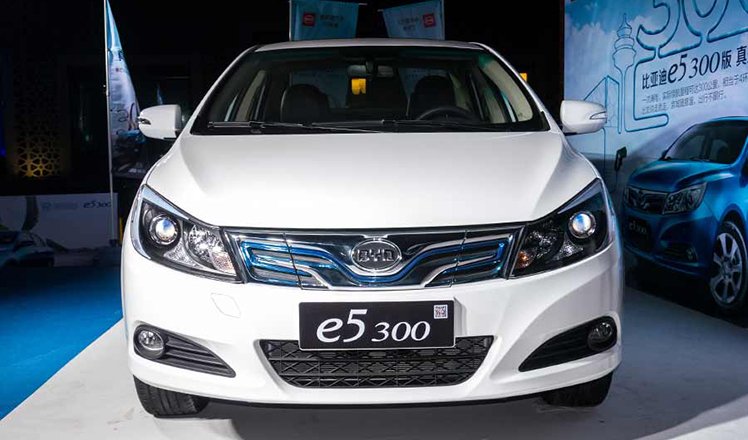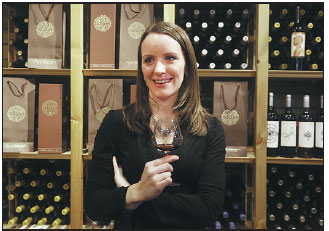Belle from Bordeaux promotes family legacy with flair
Updated: 2016-04-05 08:52
By Meghan Horihan for China Daily(China Daily)
|
||||||||
Wineries in Bordeaux, France, have always been about preserving the history and traditions of winemaking. Now, however, they must also embrace the ever-changing wine industry in China, says Helene Ponty, who represents her family's winery in the Middle Kingdom.
The Ponty family has been making wine in Bordeaux since 1905, but China is newer turf. Specializing in Merlot, Le Ponty wines came to the mainland in 2012. The brand now exports six handcrafted wines from a small village in Fronsac to provinces all over China.
Ponty, the 29-year-old daughter of current owner Michel Ponty, spearheads those efforts. She initially had little to no interest in joining the family business, and even her family wasn't clinking glasses in celebration right away.
"My parents didn't think it would be successful," she remembers. "They thought I could do something better. You know, why would I not work with a big company?"
Also, history suggests that, for family-owned wineries, a family member inheriting responsibilities will typically find they are better at making wine than selling it, Ponty says.
The winemaking techniques come from the family's century-old heritage. The Pontys harvest their grapes by hand, which is something less than 15 percent of wineries in the world still do. Helene Ponty took great delight, during a recent visit home last fall, in creating a video on the process that she posted on social media in China.
When she moved to China, selling wine was not the plan. But soon she found she wanted to connect the dots for less-educated wine drinkers, who felt intimidated by something that was old hat for the Ponty family.
"Seeing how my parents talk about it in a language that did not allow other people to understand - that's what made me interested," she says.
While she taught her new customers about wine, she also had to do some major learning about what Chinese consumers were looking for. This is an ongoing lesson, as markets can change every six months and consumer trends vary greatly city-to-city.
That keeps her on her toes, she says, smiling.
Feedback is always flowing, and while sometimes she has to take advice with a grain of salt, some needed changes became apparent when Le Ponty arrived in the China market.
Marketing, designs and labels were once only a second thought. It's about the wine after all, but that isn't always enough anymore: For her, Ponty says, it's become about creating an experience with packaging and connecting with consumers by spreading the wine culture.
It took about a year and a half of trial and error in China before things seemed to click, she says. Fast forward to today, the winery has seen overwhelming success, with 75 percent of all sales now in China, mostly thanks to group buying.
"It's also scary," she says. "We've done 100 percent growth every year since we've started. At some point you can't sustain that."
While trying to keep up with growth, one might wonder whether the wine quality suffers along the way.
"That's something that's really important for us right now," Helene says. "Trying to grow production so we can keep up with demand, but at the same time not changing the way we do things."
The China wine market is telling them to move faster, but they simply cannot make the wine quicker. The focus is about predicting future markets and planting more vineyards based on that. Thinking 20 years ahead might seem daunting, but Ponty says it's a great place to be.
She has a good grasp on distribution, everywhere from Beijing and Xiamen to Shanghai and Chengdu, where she exhibited Le Ponty wines at the annual wine fair in late March. Within the next few years, she wants to better organize those channels and also gain recognition in China for Le Ponty as a part of the middle-end category of wine.
The future is uncertain, but one thing she understands is the need to avoid complacency. She believes that as the market matures, she'll have many more competitors to worry about.
"Who knows? Maybe the new guys will come in and the old ones don't adapt, so they just get pushed out," she says. "But maybe not. We'll see."
Adding more vineyards can make tradition expensive to maintain. Ponty says, however, this is equally important to her family and to her clients in China, who keep coming back for more.
"I think people in China care more and more about where what they're buying comes from. They care about the artisan part," she says. "It's not something you find a lot around here."
|
Helene Ponty promotes wine culture in China.Liu Zhe / China Daily |
(China Daily 04/05/2016 page19)
- Xi: Talks 'only correct way' for China, ROK
- Xi to Obama: Disputes should be managed
- Cypriot court remands in custody man suspected of hijacking EgyptAir flight
- Govt eyes luxury tourists amid concerns over safety
- Sleep tight and don't let sharks bite at Paris aquarium
- Aung San Suu Kyi appointed as Myanmar's new foreign minister

 Ancestral temples continue to bring family members together
Ancestral temples continue to bring family members together
 Culture Insider: 8 things you may not know about Clear and Bright
Culture Insider: 8 things you may not know about Clear and Bright
 Discover beautiful China in spring blossom (IV)
Discover beautiful China in spring blossom (IV)
 Stars shine at gala of World Figure Skating Championships
Stars shine at gala of World Figure Skating Championships
 Female cops combine warmth with strictness
Female cops combine warmth with strictness
 BYD launches two new electric models, Qin EV and e5
BYD launches two new electric models, Qin EV and e5
 Discover beautiful China in Spring blossom (II)
Discover beautiful China in Spring blossom (II)
 Xi calls for bigger progress in China-Denmark ties
Xi calls for bigger progress in China-Denmark ties
Most Viewed
Editor's Picks

|

|

|

|

|

|
Today's Top News
Marriott unlikely to top Anbang offer for Starwood: Observers
Chinese biopharma debuts on Nasdaq
What ends Jeb Bush's White House hopes
Investigation for Nicolas's campaign
Will US-ASEAN meeting be good for region?
Accentuate the positive in Sino-US relations
Dangerous games on peninsula will have no winner
National Art Museum showing 400 puppets in new exhibition
US Weekly

|

|








